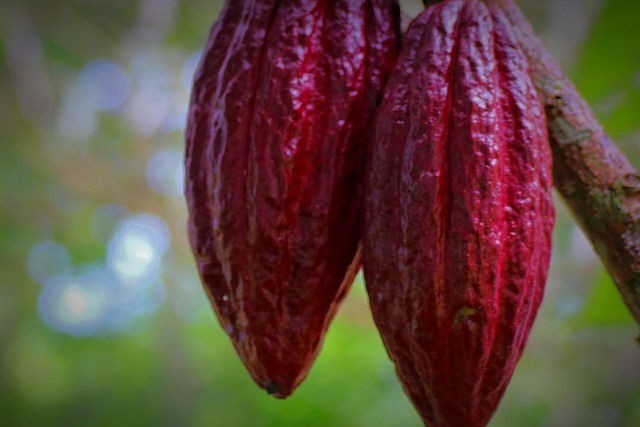Humans consume about 5 million tons of cacao bean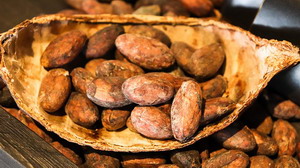 s yearly. As a comparison, it ranks behind coffee at 10 million tons and tea at 7.5 million tons consumed each year as the most widely used psychoactive chemicals by us earthlings. Yes, we like feeling up and ready for action. These substances provide caffeine and similar chemicals that stimulate our brains and make our day go better. But there is more. Cocoa offers several notable health benefits, primarily due to its rich content of flavonoids, particularly flavanols, which are powerful antioxidants. s yearly. As a comparison, it ranks behind coffee at 10 million tons and tea at 7.5 million tons consumed each year as the most widely used psychoactive chemicals by us earthlings. Yes, we like feeling up and ready for action. These substances provide caffeine and similar chemicals that stimulate our brains and make our day go better. But there is more. Cocoa offers several notable health benefits, primarily due to its rich content of flavonoids, particularly flavanols, which are powerful antioxidants.
Cardiovascular Health: Cocoa flavanols can help improve blood flow by promoting the production of nitric oxide, whic h relaxes blood vessels. This may lead to modest reductions in blood pressure and improved circulation. Some studies suggest regular cocoa consumption might support heart health by improving cholesterol profiles and reducing inflammation in blood vessels. h relaxes blood vessels. This may lead to modest reductions in blood pressure and improved circulation. Some studies suggest regular cocoa consumption might support heart health by improving cholesterol profiles and reducing inflammation in blood vessels.
Cognitive Function: The flavanols in cocoa may enhance
 brain function by increasing blood flow to the brain. Research indicates that cocoa consumption might improve memory, attention, and processing speed, particularly in older adults. Some studies have even suggested potential protective effects against cognitive decline. brain function by increasing blood flow to the brain. Research indicates that cocoa consumption might improve memory, attention, and processing speed, particularly in older adults. Some studies have even suggested potential protective effects against cognitive decline.
Mood and Mental Well-being: Cocoa contains compounds like phenylethylamine and anandamide that may influ ence mood. It also stimulates the release of endorphins and serotonin, potentially contributing to feelings of well-being. The small amount of caffeine and theobromine in cocoa can provide a mild energy boost without the jitters often associated with coffee. ence mood. It also stimulates the release of endorphins and serotonin, potentially contributing to feelings of well-being. The small amount of caffeine and theobromine in cocoa can provide a mild energy boost without the jitters often associated with coffee.
Dental Health Benefits: Theobromine, a natural compound found in cocoa, has shown promising effects for dental health. Research suggests that theobromine may help stre ngthen tooth enamel by promoting remineralization, making teeth more resistant to decay. Some studies indicate it might be more effective than fluoride at hardening tooth enamel. Additionally, cocoa’s antibacterial properties may help reduce harmful bacteria in the mouth that contribute to tooth decay and gum disease. However, this benefit is most relevant to sugar-free cocoa products, as the added sugars in most chocolate products can counteract these positive effects. ngthen tooth enamel by promoting remineralization, making teeth more resistant to decay. Some studies indicate it might be more effective than fluoride at hardening tooth enamel. Additionally, cocoa’s antibacterial properties may help reduce harmful bacteria in the mouth that contribute to tooth decay and gum disease. However, this benefit is most relevant to sugar-free cocoa products, as the added sugars in most chocolate products can counteract these positive effects.
Antioxidant Properties: Cocoa is exceptionally rich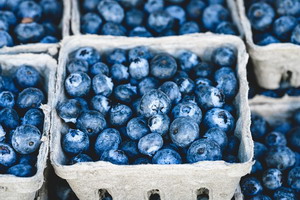 in antioxidants, containing higher levels than many other foods including blueberries and green tea. These antioxidants help combat oxidative stress and reduce inflammation throughout the body. in antioxidants, containing higher levels than many other foods including blueberries and green tea. These antioxidants help combat oxidative stress and reduce inflammation throughout the body.
An interesting aspect of cacao most people don’t know is that it is a fermented food product. When freshly picked, the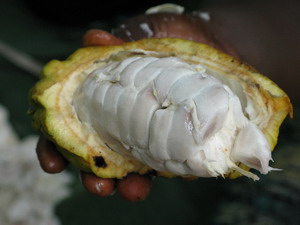 seeds of the cacao pod are very bitter and astringent. After cocoa pods are harvested and cracked open, the beans are removed along with their surrounding pulp and placed in boxes, baskets, or heaps for fermentation. This process typically lasts 3-7 days and involves naturally occurring yeasts, bacteria, and other microorganisms that consume the sugary pulp around the beans. During fermentation, several critical changes occur inside the beans themselves. The process generates heat (reaching temperatures of 113-122°F) and creates acidic conditions that penetrate the bean. This triggers enzymatic reactions that break down proteins and reduce the beans’ natural bitterness and astringency. The beans’ color begins to change from purple to brown as tannins are modified and new compounds form. seeds of the cacao pod are very bitter and astringent. After cocoa pods are harvested and cracked open, the beans are removed along with their surrounding pulp and placed in boxes, baskets, or heaps for fermentation. This process typically lasts 3-7 days and involves naturally occurring yeasts, bacteria, and other microorganisms that consume the sugary pulp around the beans. During fermentation, several critical changes occur inside the beans themselves. The process generates heat (reaching temperatures of 113-122°F) and creates acidic conditions that penetrate the bean. This triggers enzymatic reactions that break down proteins and reduce the beans’ natural bitterness and astringency. The beans’ color begins to change from purple to brown as tannins are modified and new compounds form.
Fermentation is where chocolate’s complex flavor p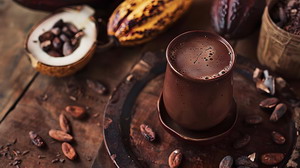 rofile begins to emerge. The process creates hundreds of flavor precursor compounds that will later develop into the characteristic chocolate taste during roasting. Without proper fermentation, cocoa beans would taste extremely bitter, astringent, and unpalatable. Well-fermented beans develop fruity, floral, or nutty notes that vary depending on the cocoa variety and fermentation conditions. Interestingly, fermentation affects the levels of beneficial compounds in cocoa. While some flavanols may be reduced during this process, fermentation also creates new bioactive compounds and can make certain nutrients more bioavailable. The overall antioxidant capacity is influenced by fermentation conditions. The fermentation process essentially transforms inedible raw cocoa beans into the foundation for all chocolate products, making it one of the most important steps in the journey from cacao tree to chocolate bar. rofile begins to emerge. The process creates hundreds of flavor precursor compounds that will later develop into the characteristic chocolate taste during roasting. Without proper fermentation, cocoa beans would taste extremely bitter, astringent, and unpalatable. Well-fermented beans develop fruity, floral, or nutty notes that vary depending on the cocoa variety and fermentation conditions. Interestingly, fermentation affects the levels of beneficial compounds in cocoa. While some flavanols may be reduced during this process, fermentation also creates new bioactive compounds and can make certain nutrients more bioavailable. The overall antioxidant capacity is influenced by fermentation conditions. The fermentation process essentially transforms inedible raw cocoa beans into the foundation for all chocolate products, making it one of the most important steps in the journey from cacao tree to chocolate bar.
So how much cacao do you need to produce any re al health benefits? To answer that question, you must first ask what other processing has been done to the cacao beans? Real cacao powder is still pretty strong-tasting. It is the beneficial flavanols that give it that harsh taste. Most cacao powder used in this country will have been treated with a strong alkali solution (called Dutching), which neutralizes these flavanols. Unfortunately, this also destroys most of the health benefits. So the chocolate you find in your peanut butter cups or Hershey’s bars has little to no healthful benefits to it. It’s better to find good-quality dark chocolate that has at least 70% cocoa content. It is important to note that “cacao” refers to unroasted cocoa beans that have been ground at low temperatures, while“cocoa” refers to roasted cocoa beans that have typically been treated with alkali. Cocoa has a milder and more familiar chocolate flavor but has lost most of the health-giving nutrients – although exactly how much difference there is between them is debated. al health benefits? To answer that question, you must first ask what other processing has been done to the cacao beans? Real cacao powder is still pretty strong-tasting. It is the beneficial flavanols that give it that harsh taste. Most cacao powder used in this country will have been treated with a strong alkali solution (called Dutching), which neutralizes these flavanols. Unfortunately, this also destroys most of the health benefits. So the chocolate you find in your peanut butter cups or Hershey’s bars has little to no healthful benefits to it. It’s better to find good-quality dark chocolate that has at least 70% cocoa content. It is important to note that “cacao” refers to unroasted cocoa beans that have been ground at low temperatures, while“cocoa” refers to roasted cocoa beans that have typically been treated with alkali. Cocoa has a milder and more familiar chocolate flavor but has lost most of the health-giving nutrients – although exactly how much difference there is between them is debated.
So back to the question of how much? If we are talking about cacao powder, then most studies have shown bene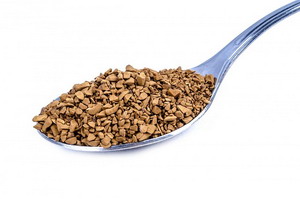 fit with doses of 1 to 2 tablespoons a day. It does not have to be taken all at once but enjoyed throughout the day. I put it in my nutrient smoothie that I sip on for breakfast and lunch. I, however, have to leave it alone after about 2 p.m., as the small concentration of theobromine and caffeine messes with my sleep. The dental benefits are even more challenging. Most studies have been with direct application of the theobromine in various compounds to the teeth directly. I created a toothpaste for myself and Ellen to do this. Occasionally, I have some available in the office. There is a commercial toothpaste called Theodent that also does this. fit with doses of 1 to 2 tablespoons a day. It does not have to be taken all at once but enjoyed throughout the day. I put it in my nutrient smoothie that I sip on for breakfast and lunch. I, however, have to leave it alone after about 2 p.m., as the small concentration of theobromine and caffeine messes with my sleep. The dental benefits are even more challenging. Most studies have been with direct application of the theobromine in various compounds to the teeth directly. I created a toothpaste for myself and Ellen to do this. Occasionally, I have some available in the office. There is a commercial toothpaste called Theodent that also does this.
In essence, cacao is a beneficial beverage with num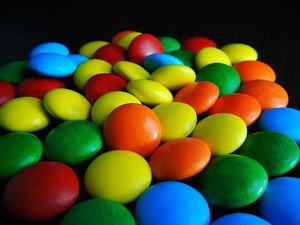 erous health advantages. However, the more processed and the more additives (such as sugar) it undergoes, the less advantageous it becomes. Paradoxically, like most ultra-processed foods, the more they are altered, the more appealing they become to our taste buds. This phenomenon raises questions about the influence of our taste buds on our food choices. While unhealthy foods should be unpleasant, the processing of food aims to enhance its palatability, leading to excessive consumption and financial gain for food processors. In some cases, it appears that our taste buds may override our rational judgment regarding food choices. erous health advantages. However, the more processed and the more additives (such as sugar) it undergoes, the less advantageous it becomes. Paradoxically, like most ultra-processed foods, the more they are altered, the more appealing they become to our taste buds. This phenomenon raises questions about the influence of our taste buds on our food choices. While unhealthy foods should be unpleasant, the processing of food aims to enhance its palatability, leading to excessive consumption and financial gain for food processors. In some cases, it appears that our taste buds may override our rational judgment regarding food choices.
Take care,
Yesterday was Ellen’s big day – surgery! Her left eye has been sewn shut for the last 5 weeks while the skin graft from
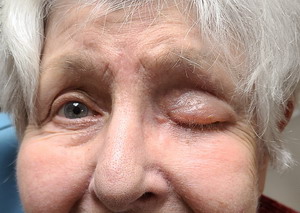 her neck did its job of replacing her lower eyelid and upper cheek. Everything was healed up and yesterday the doctor ‘unzipped’ her eye. Those were his words. After numbing the area he literally just took a tiny pair of scissors and cut the eyelid open. That’s it. No stitches, no cauterization, nothing. Now it just needs to heal. her neck did its job of replacing her lower eyelid and upper cheek. Everything was healed up and yesterday the doctor ‘unzipped’ her eye. Those were his words. After numbing the area he literally just took a tiny pair of scissors and cut the eyelid open. That’s it. No stitches, no cauterization, nothing. Now it just needs to heal.
Artificial sweeteners cause diabetes!
We all know sugar is the main cause for diabetes,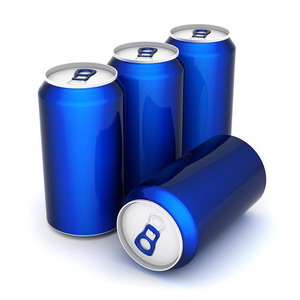 but it turns out our favorite sugar substitute is even worse! Just one diet soda a day increases your risk for diabetes by 38%. This is not the case for stevia or monk fruit. but it turns out our favorite sugar substitute is even worse! Just one diet soda a day increases your risk for diabetes by 38%. This is not the case for stevia or monk fruit.
More
___________________________
“Peace is unavailable on this planet or in our lives until we take responsibility for everything in our lives. Failure to do so leaves us blaming others which destroys peace.“
~David DeLapp
_____________________________________
Self sabotage unavoidable for some

A fascinating study conducted in 24 different countries had folks play a game in which certain choices helped them win while other choices lead to loss. About a quarter of the people were able to figure out how to win. Almost half were able to win once the trick to the game was explained to them. But the last quarter kept losing no matter how many times they failed and repeatedly had the answer of how to win explained to them. For some reason this quarter could not grasp that the outcome of the game had anything to do with their choices. Initially the researchers thought that this was just a problem with the students at their university, so they reproduced the experiment across all age groups and 24 different cultures. I think we are doomed!
More
____________________________
“Who we are is defined by the aspects of God/’what is’ that we appreciate.“
~David DeLapp
________________________________________
Not all probiotics are good
Some probiotics help us get rid of bad gut bacteria
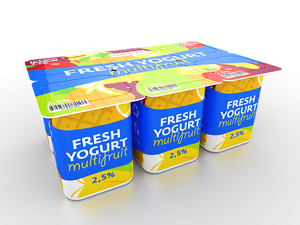 while others actually make the problem worse. The popular L. acidophilus made some infections even worse while L. gasseri wiped out the bacterial infections. This is a little scary since L. acidophilus seems to be in every yogurt and fermented dairy. while others actually make the problem worse. The popular L. acidophilus made some infections even worse while L. gasseri wiped out the bacterial infections. This is a little scary since L. acidophilus seems to be in every yogurt and fermented dairy.
More
________________________
“Your opinion is important when you have creative control over what is happening, if you don’t then your opinion means nothing. If we are not the creator, then what is just is. It is not for us to judge.“
~David DeLapp
|
|
